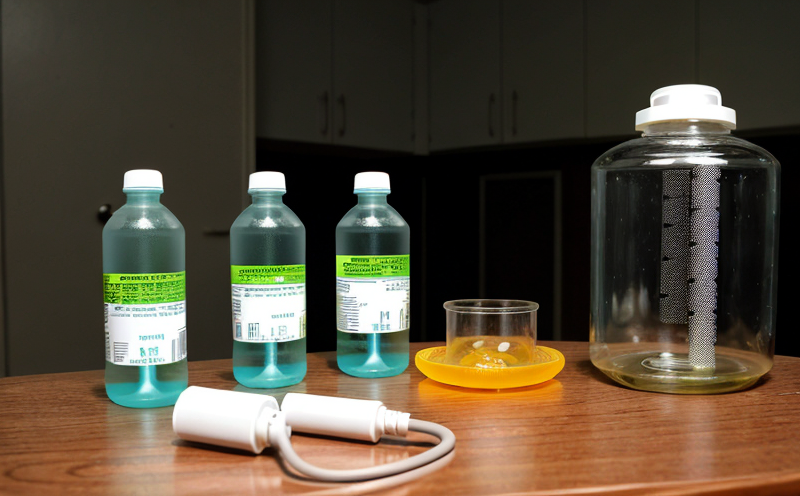ASTM D7283 Radium 226 Determination Test in Water
The ASTM D7283 standard is widely recognized as a key method for determining radium-226 concentrations in water. This service plays a crucial role in ensuring the safety and compliance of drinking water, wastewater, and other potable water sources with regulatory standards.
Radon progeny, such as radium-226, are significant environmental contaminants that can pose health risks if present at high levels in water supplies. The testing procedure outlined in ASTM D7283 ensures accurate quantification of these elements, which is essential for the protection of public health and the environment.
The method described in this standard involves the collection of a representative water sample, followed by its treatment to ensure that it is suitable for analysis. Afterward, the sample undergoes a series of chemical separations, typically using ion exchange resins or other specific reagents aimed at isolating radium-226. The isolated species are then measured using high-resolution mass spectrometry techniques.
ASTM D7283 provides detailed protocols for both the preparation and analysis phases, ensuring that all steps are carried out with precision to minimize errors and ensure accurate results. This level of detail is critical in maintaining consistency across laboratories and jurisdictions, which is particularly important given the stringent regulatory requirements governing water quality.
The importance of this test cannot be overstated, especially considering its role in safeguarding public health by identifying potential sources of contamination. Compliance with ASTM D7283 helps facilities adhere to federal guidelines such as those set forth by the Environmental Protection Agency (EPA) and other relevant regulatory bodies.
In summary, the ASTM D7283 radium-226 determination test is a critical tool in environmental monitoring and water quality assessment. By adhering strictly to this standard, laboratories can provide reliable data that supports informed decision-making processes related to water safety and compliance.
Applied Standards
| Standard | Description |
|---|---|
| ASTM D7283-19 | This standard specifies procedures for the determination of radium in water by isotope dilution inductively coupled plasma mass spectrometry (ID-ICP-MS). |
| ISO 5026-4 | International standard that provides guidelines on the measurement of alpha-emitting radionuclides in water. |
| EN ISO 17025:2017 | A laboratory must be accredited to this standard to ensure it meets the requirements for competence in testing and calibration. |
The ASTM D7283-19 standard is particularly relevant because it addresses specific issues concerning radium-226 detection, making it a preferred choice among regulatory agencies and industry professionals. It ensures that laboratories follow rigorous procedures to achieve precise measurements, thereby enhancing the reliability of test results.
Scope and Methodology
The ASTM D7283 standard outlines comprehensive steps for determining radium-226 in water samples. The process begins with sample collection using appropriate sampling techniques to ensure representativeness. Once collected, the samples are stored under controlled conditions until they can be processed.
Sample preparation is a critical step that involves several stages designed to isolate and concentrate radium-226 from other elements present in the water matrix. This typically includes filtration, digestion of organic matter, and precipitation or ion exchange methods tailored to target radium-226 specifically.
The isolated radium-226 is then quantified using high-resolution mass spectrometry (HRMS). HRMS offers unparalleled precision for detecting even trace amounts of radium, making it indispensable for this type of analysis. The instrument must be calibrated regularly to maintain accuracy and reliability throughout the testing process.
After analysis, the results are reported in units of picocuries per liter (pCi/L) or nanobecquerels per liter (nBq/L), depending on the preference of the regulatory body or client. Reporting must include details about sample collection, preparation methods used, and any potential sources of error that could affect accuracy.
Compliance with ASTM D7283 ensures not only accurate measurement but also adherence to best practices in laboratory operations. This includes proper documentation of all procedures followed during sampling, preparation, and analysis, as well as regular calibration checks for analytical instruments used.
Use Cases and Application Examples
The ASTM D7283 radium-226 determination test finds application in various sectors where water quality is paramount. One such area is municipal water supply systems, which rely heavily on this testing to ensure that their treated waters meet stringent safety standards.
Water utilities use ASTM D7283 to monitor the effectiveness of purification processes and identify any potential sources of contamination before they become widespread issues. This proactive approach helps prevent public health crises by addressing problems early on in the supply chain.
In addition to municipal water supplies, industrial facilities also benefit from this testing when dealing with wastewater treatment plants. By regularly monitoring radium levels in effluents, companies can ensure that they comply with discharge limits imposed by environmental protection authorities.
Another important use case lies within research and development laboratories focused on developing new purification technologies or improving existing ones. These entities often employ ASTM D7283 to validate their methods against established standards before commercializing innovations.
Farmers who rely on groundwater for irrigation purposes may also find value in this testing, especially if they operate close to areas known for higher natural radium concentrations. Accurate knowledge of radium levels helps them make informed decisions about crop selection and management practices.
Lastly, private homeowners concerned about their personal water supply can seek out laboratories certified under ASTM D7283 to perform independent tests on their own wells or taps. This information provides peace of mind regarding the quality of drinking water available at home.





